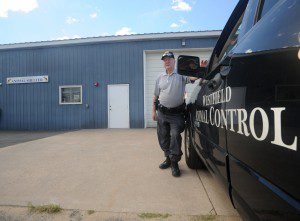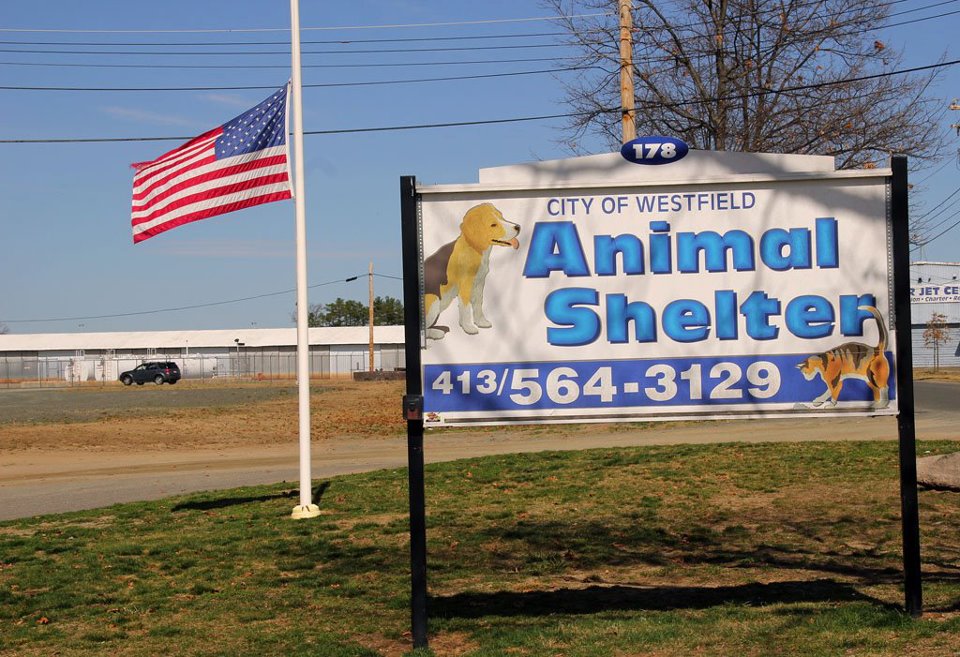
Kenneth Frazer, director of animal control operations, stands next to his work vehicle at the Westfield Animal Shelter. (Photo by Carl E. Hartdegen)
WESTFIELD – Gov. Deval Patrick, in a ceremony staged last week in Ashland, signed a sweeping revision of the laws governing the control of animals in the Commonwealth. According to Kenneth Frazer, the operations manager of the city’s animal control operations, the revision has been ten years in the making and brings the state’s animal control laws “into the 21st century rather than the 19th century.”
Frazer said that it has been ten years since work to update the animal control laws began at a meeting in the office of Mike Cahill, the director of the Division of Animal Health of the Commonwealth’s Department of Agricultural Resources.
He said that while the bill signed Thursday updates and improves the language and fees pertaining to the Commonwealth’s laws regulating domestic animals, there are three very important changes established by the bill, sponsored by State Sen. Patricia Jehlen (D-Somerville) and co-sponsored by 36 senators and representatives.
One of the most important provisions of the bill allows a plaintiff seeking a protective order to petition the court to extend protection to a pet, as well.
“This is great for a lot of women, he said. “Women have a tendency to stay with their spouse in a domestic violence situation, because of their animals.”
He said that now, if a pet is included in a protective order, “Whoever has that animal can do nothing with it. They can’t sell it, they can’t give it away, they can’t harm it in any way” as a means of getting at the plaintiff of a protective order.
A second benefit of the bill, Frazer said, is that it includes a funding mechanism for training of animal control officers.
“Right now” Frazer said, “towns hire individuals and send them out to be animal control officers with no training, no idea of what they’re doing and just send them out to catch dogs and handle complaints.”
In Westfield, Kerri Francis, the city’s part time animal control officer, had already been to the Animal Control Academy officered by the Animal Control Officers Association of Massachusetts while she was still a volunteer at the city’s animal shelter, so she was trained before she was hired.
That situation does not prevail everywhere and now an animal control officer hired will have 12 months to be trained.
The funding for the training will come from voluntary check-off contribution by residents when they file state income tax returns.
That fund, the Homeless Animal Prevention and Care Fund, will also be used to finance the third major change to come about because of the revamping of the animal control laws: a spay and neuter program for stray animals and for pets owned by low income residents.
The expected effect of the spay and neuter program will be a significant reduction of homeless animals resulting in fewer animals in shelters.
The bill also will reduce the animal population in shelters, by reducing the required waiting period before stray pets can be adopted from ten days to seven.
Frazer has mixed feelings about that change.
“Five to seven days has been the norm for people picking up their animals,” he said. “By the end of ten day’s you’re probably not going to have anybody pick it up.”
The exception is when a pet gets loose from a temporary situation while the owners are away, on vacation for example. The waiting period may expire before the pet owner returns from vacation and starts to seek a missing pet. In that situation the shorter waiting period may sometimes be a problem but it may be alleviated if shelter staff can identify the owner of a pet.
Frazer stresses the importance of safeguarding a pet by emplacing a microchip under a pet’s skin as a positive means of identification.
“I don’t care how old your dog is, how young your dog is, microchip that dog,” Frazer urged. “And, when you microchip it, call up the microchip company and register it.”
He said that he encounters many dogs that have subcutaneous microchips that have not been registered. He said of vets, shelters and animal control officers, “the first thing they do is check for a microchip” but if the registration is not completed or the registered information is obsolete, the microchip is useless.
A change the new bill makes that does not apply particularly to Westfield is that it bars communities for enacting breed specific regulations.
Westfield has no such ordinances, he said, but he hopes it will encourage insurance companies to stop restricting policies offered to potential customers based on the breed of dog living in a home.
Another important change in the law, he said, is “We’re no longer called ‘dog catchers’, we’re now called animal control officers. … The day of dog catcher is long gone.”






